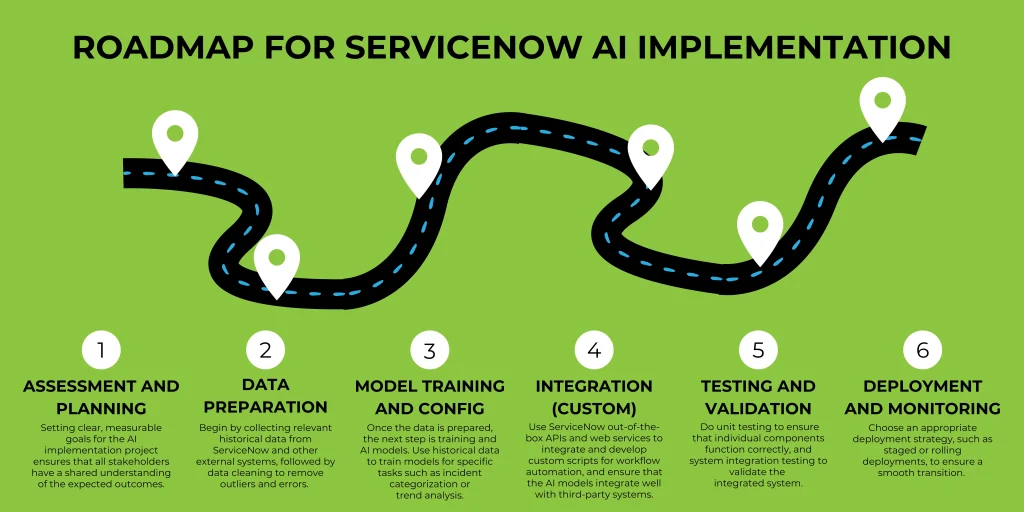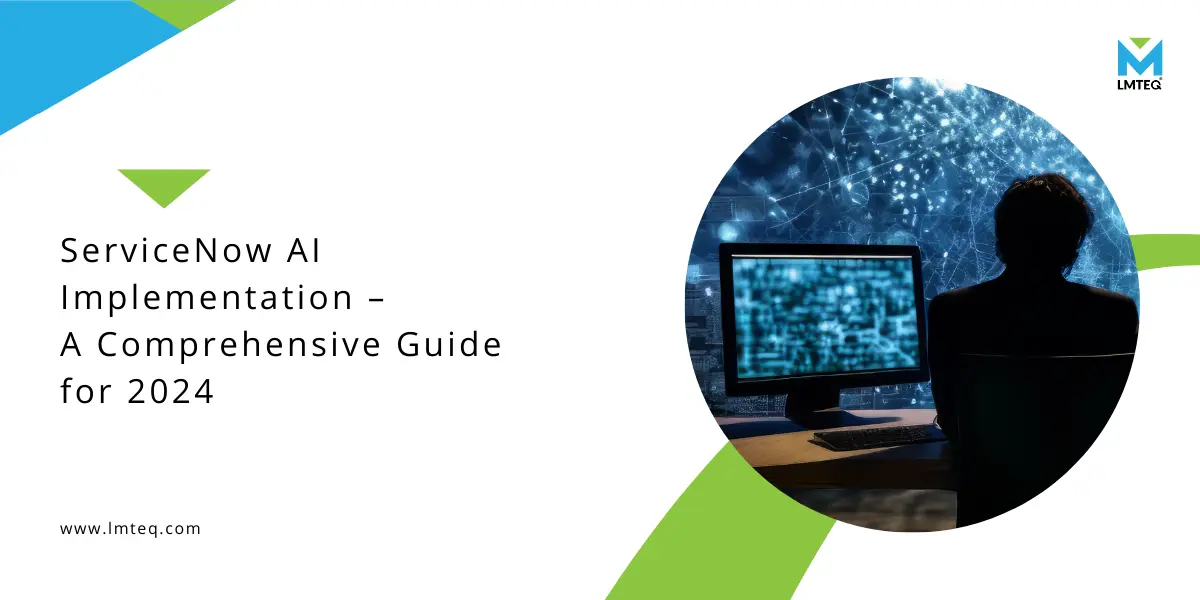Building Blocks of AI on ServiceNow
ServiceNow’s AI capabilities are built on several key components, each aiming to address specific business needs through cutting-edge technological solutions.
Predictive Intelligence
Predictive Intelligence basically uses machine learning algorithms to analyze historical data and predict future outcomes.
This component is very important for automating incident categorization, prioritization, and trend prediction.
Technically, how this work is developing and training data models (ML algorithms) using historical incident data. These models are trained using supervised learning algorithms to classify and predict outcomes based on input data.
The training process involves collecting and cleaning data, selecting appropriate features, training the models, and validating their accuracy.
Natural Language Understanding (NLU)
NLU enhances the Virtual Agent or chatbot by allowing it to understand and process human language, making interactions more engaging and trustworthy.
The function of NLU involves intent recognition, which identifies user intentions from their queries, and entity extraction, which pulls out relevant details such as dates, locations, or product names.
These capabilities are built using pre-trained language models that are fine-tuned for specific tasks within ServiceNow, enabling the platform to understand and respond to complex user inputs accurately.
Virtual Agent
The Virtual Agent or chatbots in general, provides conversational AI capabilities, enabling automated customer support and self-service through natural language interactions.
At its core, the Virtual Agent relies on Natural Language Understanding (NLU) to interpret and respond to user queries. Conversation flows are designed to guide interactions, ensuring that users receive accurate and relevant information.
Integration points with backend systems allow the Virtual Agent to perform tasks like, retrieving data, updating records, and completing transactions, making it an essential tool for great customer service.
Machine Learning (ML)
Machine Learning in ServiceNow allows for the creation and deployment of custom predictive models to address various business challenges. This involves selecting appropriate algorithms (supervised, unsupervised, or reinforced), preparing training data, and developing training pipelines that automate the process of training and validating models.
Once trained, these models are deployed within the ServiceNow platform to provide real-time predictions, enabling proactive decision-making and improved operational efficiency.
Once trained, these models are deployed within the ServiceNow platform to provide real-time predictions, enabling proactive decision-making and improved operational efficiency.
Roadmap for ServiceNow AI Implementation
ServiceNow AI Implementation involves a systematic approach, ensuring all technical and business aspects are covered.
Assessment and Planning
The first step in implementing ServiceNow AI solutions is a thorough assessment and planning phase. This involves conducting workshops to understand business goals and identify potential AI opportunities.
A technical feasibility analysis is essential to assess the current infrastructure and readiness for AI integration, like integration with CMDB for predictive analysis and so on.
Setting clear, measurable goals for the AI implementation project ensures that all stakeholders have a shared understanding of the expected outcomes.
Data Preparation
Data preparation is a critical step in the AI implementation process. It begins with collecting relevant historical data from ServiceNow and other external systems, followed by data cleaning to remove outliers and errors.
Data labeling and annotation are necessary for training supervised learning models, and integration with existing data sources ensures that the AI models have access to the required data.
Model Training and Configuration
Once the data is prepared, the next step is training and configuring the AI models. This involves using historical data to train models for specific tasks such as incident categorization or trend analysis.
Configuring Predictive Intelligence involves setting up these models to analyze incident data and automate categorization.
For Virtual Agents, this step includes designing conversation flows and training NLU models to ensure accurate intent recognition and response generation.
Integration and Customization
Integration and customization are other crucial factors for ensuring that AI capabilities are seamlessly embedded within existing workflows.
This involves using ServiceNow out-of-the-box APIs and web services to facilitate integration, developing custom scripts for workflow automation, and ensuring that the AI models integrate well with third-party systems.
Customization allows organizations to tailor the AI solutions to their specific needs, enhancing their effectiveness.
Testing and Validation
Before deploying the AI models, thorough testing and validation are necessary.
Testing involves unit testing to ensure that individual components function correctly, system integration testing to validate the integrated system, and performance benchmarking to measure AI model performance against predefined benchmarks.
Validation against business key performance indicators (KPIs) ensures that the AI models meet the expected business outcomes.
Deployment and Monitoring
The final step in the implementation process is deploying the AI models and establishing monitoring protocols.
Choosing appropriate deployment strategies, such as staged or rolling deployments, ensures a smooth transition.
Continuous monitoring of AI performance is essential to identify any issues and ensure that the models maintain their accuracy and effectiveness.
Regular retraining of models or choosing reinforced ML models and implementing feedback loops for continuous improvement help in keeping the AI solutions aligned with ever-changing business needs.
Technical Challenges and Solutions
Implementing AI in ServiceNow comes with several technical challenges that need to be addressed for successful deployment.
Data Quality and Management
Ensuring high-quality data is one of the significant challenges in AI implementation. Poor data quality can lead to inaccurate model predictions and reduced effectiveness.
To address this, organizations must implement data preprocessing techniques and automated data cleansing processes. This ensures that the data used for training and predictions is clean, consistent, and reliable.
Model Performance and Accuracy
Achieving high accuracy and performance from AI models is another critical challenge. This involves optimizing models through hyperparameter tuning, selecting appropriate algorithms, and regular retraining to adapt to new data.
Performance monitoring and benchmarking against industry standards help in maintaining model effectiveness and identifying areas for improvement.
Integration Complexity
Seamless integration with existing systems and workflows is essential for the successful implementation of AI solutions. This can be complex due to the diverse nature of enterprise systems.
Utilizing ServiceNow IntegrationHub and developing custom APIs can simplify the integration process, ensuring that AI capabilities are embedded smoothly into existing workflows.
Security and Compliance
Maintaining data security and regulatory compliance is crucial in any AI implementation. This involves implementing robust security measures to protect sensitive data and conducting regular compliance checks to ensure adherence to industry regulations.
Encryption, access controls, and auditing mechanisms are some of the measures that can help in achieving security and compliance goals.
Advanced Features and Customization in ServiceNow AI
ServiceNow AI offers advanced features that can be customized to meet specific business needs.
Custom AI Models
ServiceNow’s AI Model Builder allows organizations to create and integrate custom machine learning models tailored to their specific requirements.
These models can be developed using internal data and deployed within the ServiceNow platform to provide real-time insights and predictions, enhancing decision-making and operational efficiency.
Advanced Analytics and Reporting
Implementing advanced analytics and reporting capabilities within ServiceNow AI provides detailed insights into AI model performance and business outcomes.
Developing comprehensive analytics dashboards and leveraging ServiceNow Performance Analytics enables organizations to monitor AI performance, identify trends, and make data-driven decisions.
ServiceNow GenAI and AIOps
ServiceNow GenAI, the latest advancement in ServiceNow’s AI capabilities, integrates cutting-edge machine learning and natural language processing to enhance digital workflows with more adaptive and intelligent solutions.
This framework continuously learns from data, providing accurate predictions and insights for various business processes.
ServiceNow AIOps, another critical component, leverages AI to improve IT operations by automating routine tasks, analyzing vast amounts of operational data for anomaly detection, and enhancing incident response times.
Together, ServiceNow Gen AI and AIOps drive efficiency, reduce manual effort and foster proactive management of IT and business operations.
Use Cases of ServiceNow AI Solutions
ServiceNow AI can be implemented across various use cases, each providing significant business value.
Incident Management
Automating incident categorization and prioritization is one of the primary use cases of ServiceNow AI. Predictive Intelligence can analyze historical incident data and categorize incoming incidents automatically, reducing manual effort and improving response times.
This involves configuring the models to analyze incident data and automate the categorization process, ensuring that incidents are prioritized based on their severity and impact.
Customer Service Automation
Deploying Virtual Agents for automated customer support is another significant use case. Virtual Agents can handle routine customer queries, provide information, and perform tasks such as password resets or order status updates.
This can be done by designing conversation flows, training NLU models, and integrating with backend systems to ensure seamless support and enhance customer satisfaction.
Service Request Automation
Automating service request handling using NLU can significantly improve efficiency and accuracy. ServiceNow AI can recognize and process service requests automatically, routing them to the appropriate department or resolving them directly.
This involves configuring NLU intents, integrating with service request systems, and automating the fulfillment process, ensuring quick and accurate resolution of service requests.
Predictive Maintenance
Implementing predictive maintenance solutions using ServiceNow AI can help in the proactive maintenance of equipment and assets. Predictive models can analyze historical maintenance data and predict potential failures, allowing organizations to address issues before they occur. This can be achieved by preparing data, training predictive models, and integrating with the CMDB to provide real-time maintenance alerts, reducing downtime and maintenance costs.
Future Trends in ServiceNow AI Solutions
The future of ServiceNow AI is bright, with several trends and innovations on the horizon.
AI-Driven Automation
ServiceNow AI is expected to drive more automation across business processes, reducing manual efforts and increasing efficiency. This includes automating complex workflows, enhancing decision-making with real-time insights, and enabling predictive capabilities across various business functions.
Enhanced Natural Language Processing
Advancements in NLP will make Virtual Agents more intuitive and capable, improving user interactions and satisfaction. Enhanced language models, better intent recognition, and more accurate entity extraction will allow Virtual Agents to handle more complex queries and provide more accurate responses.
Integration with Emerging Technologies
ServiceNow AI will integrate with emerging technologies like IoT and blockchain, providing more comprehensive solutions and insights. IoT integration will enable real-time data collection and analysis from connected devices, while blockchain can enhance data security and transparency, making ServiceNow AI solutions even more robust and effective.
Frequently Asked Questions
Key Takeaway
ServiceNow AI implementation offers significant benefits, driving efficiency, innovation, and superior customer experiences. By following a structured approach and addressing technical challenges, businesses can successfully leverage ServiceNow AI solutions to achieve their digital transformation goals.
Ready for AI-powered digital transformation? With LMTEQ’s ServiceNow experts, you can get impeccable results with the robust ServiceNow implementation in a short amount of time.


